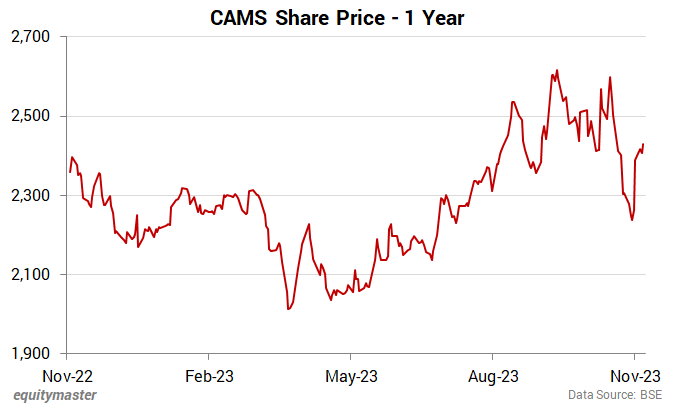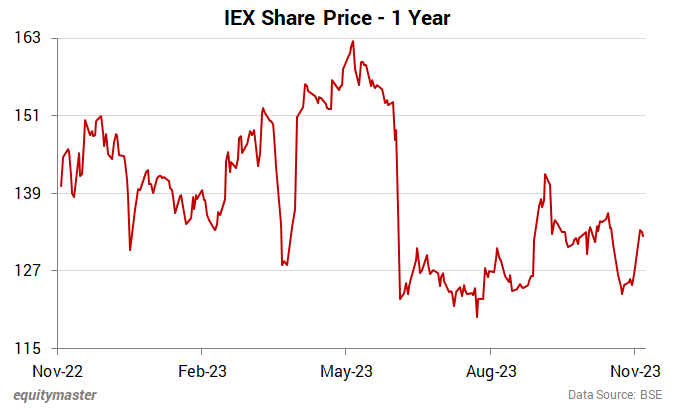- Home
- Views On News
- Nov 9, 2023 - Top 5 Monopoly Stocks to Watch Out in 2024
Top 5 Monopoly Stocks to Watch Out in 2024

Amid turbulent phases in the stock market, certain stocks stand out as beacons weathering almost all uncertainties.
Monopoly stocks also fit into this criterion. They find their strength in dominating industries where competition is limited.
These are companies which face limited competition, if not absent. They hold the power to shape pricing, command substantial market share, and consistently reap the rewards of profitability.
The number of these monopolies are rare these days compared to their presence during the 19th and 20th centuries.
And despite the rarity of true monopolies, they still exist.
In this article, we will discuss five monopoly or monopolistic stocks to keep an eye out in 2024.
#1 CDSL
First on the list is CDSL.
Central Depository Services (CDSL) is the only listed depository in India and a key beneficiary of structural growth in capital markets.
There are only two depositories in India, the other being NSDL, which is not listed yet.
As a securities depository, CDSL facilitates the holding of securities in digital form and enables securities transactions (including off-market transfers and pledges) to be processed by book entry.
It generates income from annual issuer charges (annuity nature of the income), transaction charges (market dependent), IPO/corporate activity charges, online data charges (through its subsidiary CDSL Ventures) and others.
Moreover, the extensive network and the first-mover advantage have done wonders for the company, with the fintech megatrend adding fuel to the fire.
The company is one of the major beneficiaries of rising digitalisation. Notably, the surge in market activity, both in the secondary and primary segments, fuelled by a growing number of investors and traders, has led to a rising demand for depository service.
The expansion of CDSL's market share for cumulative active demat accounts, from 40% in FY14 to an impressive 73% in FY23, underscores its dominance in the depository services sector.
The company has registered a significant growth over the last three years. The sales and net profit have grown at a 3-year CAGR of 17.3% and 11.2%, respectively.
Going forward, the company is well-positioned for growth due to expansion of National Academy Depository, a platform designed for educational certificates.

To know more, check out the CDSL company fact sheet and quarterly results.
#2 CAMS
Second on the list is CAMS.
The company is India's largest registrar and transfer agent of mutual funds, with an aggregate market share of approximately 70% based on mutual fund average assets under management.
The variety of services provided by CAMS plays an important role in developing and maintaining its clients' market perception.
The second player, Karvy, is at a distant 26% market share. CAMS, a dominant force in India's mutual fund registrar and transfer agency industry, commands an impressive 69% market share.
A substantial portion of its revenue, approximately 90%, is generated from its mutual fund operations and the remaining 10% is sourced from diverse non-MF ventures, including insurance repository, Camspay, account aggregation, and more.
In the past three years, the company has demonstrated notable growth, boasting a 3-year CAGR of 11.2% in sales and a remarkable 38.7% in net profits, largely attributed to increased realisation.
Looking ahead, CAMS anticipates an expansion in the share of non-mutual fund business, with expectations of it rising from the current 10-15% in three to five years.

To know more, check out CAMS company fact sheet and quarterly results.
#3 Praj industries
Third on the list is Praj Industries.
Incorporated in 1985, the company started its journey as a supplier of ethanol plants.
Today, it is a leading company with a bouquet of sustainable solutions for bioenergy, high-purity water, critical process equipment, breweries, and industrial wastewater treatment.
The company's bioenergy business offers a complete suite of solutions for the global ethanol industry, including process design, engineering, fabrication, and commissioning of ethanol plants.
Praj Industries has more than 50% market share in 1G ethanol and is the only player in the 2G ethanol business. This makes the company a primary beneficiary of the government's ethanol blending program.
With rising demand for biofuels, the company has taken several measures to strengthen biofuel production capacities in India.
It has collaborated with Axens, France, Sekab E-Technology AB, Sweden, and Indian Oil Corporation to produce sustainable aviation fuel (SAF), ethanol, compressed bio-gas (CBG), biodiesel, and bio-bitumen.
From a financial perspective, the company has experienced remarkable growth in the past three years. Sales and net profits have displayed an impressive 3-year CAGR of 39.7% and 43.5%, primarily driven by escalating demand and rising prices.
Praj Industries is also heavily investing in capex to build a multipurpose catalysis lab to work on fuels such as biohydrogen.
In the financial year 2023, it commissioned its first 2G ethanol biorefinery and rice straw-based commercial-scale CBG plant for the Indian Oil Corporation and Hindustan Petroleum Corporation, respectively.

To know more, check out Praj Industries' financial factsheet and latest quarterly results.
#4 IEX
Fourth on the list stands IEX.
With around 95% market share, the company enjoys monopoly and rules the energy exchange market in India.
IEX pioneered the development of power trading in India and provides an electronic platform to the various participants in the power market, comprising state electricity boards, power producers, power traders and open-access consumers.
To diversify and meet renewable energy targets, the company has extensively included renewable energy in its portfolio by introducing green energy trading and issuing renewable energy certificates (REC) to renewable energy providers.
A new player, Hindustan Power Exchange (HPX), entered market in 2022, threatening IEX's monopoly.
However, IEX has several growth plans which might help the company retain its leadership.
Turning to the financial aspect, in the preceding three years, the company has witnessed a compound annual growth rate (CAGR) of 8% in its revenue and a substantial 14.25% in net profit, primarily attributed to the surge in electricity demand.
With a strategic vision in mind the company aims to elevate the portion of green energy trading from its existing 7% to an ambitious target of 25% by 2024. To achieve it, the company is actively bolstering its renewable energy capacity on the platform.
There's more. With growing prosumers (consumers who produce and consume), IEX is exploring P2P opportunities in energy trading.
The growth plans don't stop here. IEX has set up India's first gas exchange and carbon exchange through its subsidiaries. It also plans to set up India's first coal exchange.
All this shows that the company is poised for its next leg of growth.

To know more, check out the Indian Energy Exchange company fact sheet and quarterly results.
#5 HAL
Last on the list is HAL.
Hindustan Aeronautics is a dominant supplier of aircraft, helicopters, engines, and avionics and the major provider of maintenance, repair, and overhaul services to the Indian Airforce, Indian Army, ISRO, Indian Navy, and Indian Coast Guard, among others.
It also engages with the Indian Space Research Organisation (ISRO) to contribute to India's space programs. In ISRO's Chandrayaan-3 mission, HAL worked on the development of a lander and key mechanical support equipment.
HAL has also shifted its focus towards co-development and co-designing of technology to retain intellectual property rights within the country. The aim is to introduce advanced technology to India and ensure future upgradability.
For this, HAL is seeking collaborations with foreign Original Equipment Manufacturers (OEMs).
Additionally, the production of GE-414 engines to power the Tejas Mk 2 aircraft with General Electric (GE) will be an added benefit.
In the last three years, the company has seen a 5.5% CAGR increase in revenue and an impressive 21.5% rise in net profit, primarily attributed to consecutive order wins.
Looking ahead to the financial year 2024, the company has successfully secured substantial orders from numerous organisations, and its current order book now amounts to a substantial Rs 817.8 billion (bn).
The company also recently signed a deal worth US$ 716 million (m) with GE Aviation for supplying engines.
To maintain its infrastructure and build systems for meeting the requirements of defence forces, it spent Rs 20.8 bn in capex for the financial year 2023.

To know more, check out Hindustan Aero. company fact sheet and quarterly results
Conclusion
Investing in monopoly stocks has its fair share of advantages and disadvantages. On the positive side, these stocks often provide a stable and predictable source of income. Their ability to control pricing and dominate markets can result in consistent profitability.
Additionally, they tend to weather economic downturns better than most companies, making them a safe haven during uncertain times.
However, there are downsides to consider. Monopoly stocks can sometimes face regulatory scrutiny due to their market dominance, which may lead to legal challenges and potential limitations on their operations.
Furthermore, because of their already significant market share, the room for explosive growth might be limited compared to smaller, more nimble competitors.
Diversification can also be a concern, as a portfolio heavily concentrated in monopoly stocks may lack balance and exposure to other industries.
Therefore, conducting thorough research is advisable before considering investments in these stocks.
Safe Stocks to Ride India's Lithium Megatrend
Lithium is the new oil. It is the key component of electric batteries.
There is a huge demand for electric batteries coming from the EV industry, large data centres, telecom companies, railways, power grid companies, and many other places.
So, in the coming years and decades, we could possibly see a sharp rally in the stocks of electric battery making companies.
If you're an investor, then you simply cannot ignore this opportunity.
Details of our SEBI Research Analyst registration are mentioned on our website - www.equitymaster.comDisclaimer: This article is for information purposes only. It is not a stock recommendation and should not be treated as such. Learn more about our recommendation services here...


Equitymaster requests your view! Post a comment on "Top 5 Monopoly Stocks to Watch Out in 2024". Click here!
Comments are moderated by Equitymaster, in accordance with the Terms of Use, and may not appear
on this article until they have been reviewed and deemed appropriate for posting.
In the meantime, you may want to share this article with your friends!